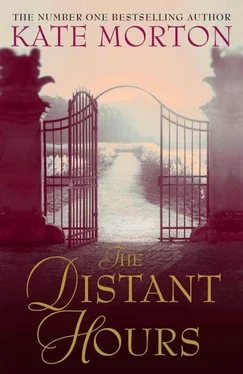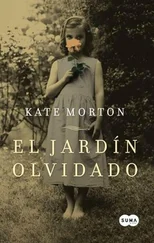And then it dawned on me, the precise nature of my lostness. Somehow I must’ve missed an early turn and I had ended up winding right around the wooded hillside instead, approaching the castle from the north rather than the south.
All’s well that end’s well, though: I’d made it relatively unscathed and I was quite sure I wasn’t yet offensively late. Even better, I’d spied a flat strip of wild grass wrapping its way around the walled castle gardens. I followed it, and finally – a triumphant trumpet flourish – stumbled upon Mrs Bird’s pillars. Across the south lawn, just where it ought to be, the front face of Milderhurst Castle rose tall and taller to meet the sun.
The quiet, steady accumulation of years I’d felt on the garden climb was more concentrated here, spun out like a web around the castle. The building had a dramatic grace and was decidedly oblivious to my intrusion. The bored sash windows gazed beyond me, looking towards the English Channel with a weary permanence of expression that emphasized my sense that I was trivial, temporary, that the grand old building had seen too much else in its time to be bothered much by me.
A clutter of starlings took flight from the chimney tops, wheeling through the sky and into the valley where Mrs Bird’s farmhouse nestled. The noise, the motion, was oddly disconcerting.
I followed their progress as they skimmed the treetops, skirling towards the tiny red-tiled roofs. The farmhouse looked so far away, I was overcome by the strangest sense that at some point during my walk up the wooded hill I’d crossed an invisible line of sorts. I’d been there , but now I was here , and something more complicated was at work than a simple shift in location.
Turning back towards the castle, I saw that a large black door in the lower arch of the tower stood wide open. Strange that I hadn’t noticed it before.
I started across the grass, but when I reached the stone front stairs I faltered. Sitting by a weathered marble greyhound was his flesh and blood descendant, a black dog of the type I would come to know as a lurcher. He’d been watching me, it seemed, the whole time I’d been standing on the lawn.
Now he stood, blocking my way, assessing me with his dark eyes. I felt unwilling, unable to continue. My breathing was shallow and I was suddenly cold. I wasn’t afraid, though. It’s difficult to explain, but it was as if he were the ferryman, or an old-fashioned butler, someone whose permission I needed before I could proceed.
He padded towards me, gaze fixed, footfalls noiseless. Brushed lightly beneath my fingertips before he turned and loped away. Disappeared without a second glance through the open door.
Beckoning me, or so it seemed, to follow.
Three Fading Sisters
Have you ever wondered what the stretch of time smells like? I can’t say I had, not before I set foot inside Milderhurst Castle, but I certainly know now. Mould and ammonia, a pinch of lavender and a fair whack of dust, the mass disintegration of very old sheets of paper. And there’s something else, too, something underlying it all, something verging on rotten or stewed but not. It took me a while to work out what that smell was, but I think I know now. It’s the past. Thoughts and dreams, hopes and hurts, all brewed together, fermenting slowly in the fusty air, unable ever to dissipate completely.
‘Hello?’ I called, waiting at the top of the wide stone staircase for a return greeting. Time passed and none came, so I said it again, louder this time. ‘Hello? Is anyone home?’
Mrs Bird had told me to go on in, that the Sisters Blythe were expecting us, that she’d meet me inside. In fact, she’d been at great pains to impress upon me that I was not to knock or ring the bell or otherwise announce my arrival. I’d been dubious – where I came from, entrance without announcement came pretty close to trespassing – but I did as she’d bid me: took myself straight through the stone portico, beneath the arched walkway, and into the circular room beyond. There were no windows and it was dim despite a ceiling that swept up to form a high dome. A noise drew my attention to the rounded top, where a white bird had flown through the rafters and hovered now in a shaft of dusted light.
‘Well then.’ The voice came from my left and I turned quickly to see a very old woman standing in a doorframe some ten feet away, the lurcher by her side. She was thin but tall, dressed in tweeds and a button-up collared shirt, almost gentlemanly in style. Her gender had been brittled by the years, any curves she’d had sunken long ago. Her hair had receded from her forehead and sat short and white around her ears with a wiry stubbornness; the egg-shaped face was alert and intelligent. Her eyebrows, I noted as I moved closer, had been plucked to the point of complete removal then drawn in again, scores the colour of old blood. The effect was dramatic, if a little grim. She leaned forward slightly on an elegant ivory-handled cane. ‘You must be Miss Burchill.’
‘Yes.’ I held out my hand, breathless suddenly. ‘Edith Burchill. Hello there.’
Chill fingers pressed lightly against mine and the leather strap of her watch fell noiselessly around her wrist bone. ‘Marilyn Bird from the farmhouse said you’d be coming. My name is Persephone Blythe.’
‘Thank you so much for agreeing to meet me. Ever since I learned of Milderhurst Castle, I’ve been dying to see inside.’
‘Really?’ A sharp twist of her lips, a smile as crooked as a hairpin. ‘I wonder why.’
That was the time, of course, to tell her about Mum, about the letter, her evacuation here as a girl. To see Percy Blythe’s face light up with recognition, for us to exchange news and old stories as we walked. Nothing could have been more natural, which is why it came as something of a surprise to hear myself say: ‘I read about it in a book.’
She made a noise, a less interested version of ‘ah’.
‘I read a lot,’ I added quickly, as if the truthful qualifier might somehow lessen the lie. ‘I love books. I work with books. Books are my life.’
Her wrinkled expression wilted further in the face of such an innocuous response, and little wonder. The original fib was dreary enough, the additional biographical titbits positively inane. I couldn’t think why I hadn’t just told the truth: it was far more interesting, not to mention honest. Some half-cocked, childish notion of wanting my visit to be my own, I suspect; for it to remain untinged by my mother’s arrival fifty years earlier. Whatever the case, I opened my mouth to backtrack but it was too late: Persephone Blythe had already motioned for me to follow as she and the lurcher started down the gloomy corridor. Her pace was steady and her footfalls light, the cane, it seemed, paying mere lip service to her great age.
‘Your punctuality pleases me, at any rate,’ her voice floated back to me. ‘I abhor tardiness.’
We continued in silence, deep and deepening silence. With each step, the sounds of outside were left more emphatically behind: the trees, the birds, the distant chattering of the somewhere brook. Noises I hadn’t even realized I was hearing until they were gone, leaving a strange airy vacuum so stark my ears began to hum, conjuring their own phantoms to fill the void; whispering sounds, like children when they play at being snakes.
It was something I would come to know well, the odd isolation of the castle interior. The way sounds, smells, sights that were clear outside the walls seemed somehow to get stuck in the old stone, unable ever to burrow their way through. It was as if over centuries the porous sandstone had absorbed its fill, trapping past impressions, like those flowers preserved and forgotten between the pages of nineteenth-century books, creating a barrier between inside and out that was now absolute. The air outside may have carried rumours of buttercups and freshly mown grass, but inside it smelled only of accumulating time, the muddy held breath of centuries.
Читать дальше












